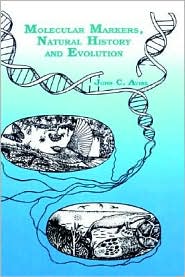Molecular Markers, Natural History And Evolution
Molecular approaches have opened new windows on a host of ecological and evolutionary disciplines, ranging from population genetics and behavioral ecology to conservation biology and systematics.\ Molecular Markers, Natural History and Evolution summarizes the multi-faceted discoveries about organisms in nature that have stemmed from analyses of genetic markers provided by polymorphic proteins and DNAs. The first part of the book introduces rationales for the use of molecular markers,...
Search in google:
Molecular approaches have opened new windows on a host of ecological and evolutionary disciplines, ranging from population genetics and behavioral ecology to conservation biology and systematics. Molecular Markers, Natural History and Evolution summarizes the multi-faceted discoveries about organisms in nature that have stemmed from analyses of genetic markers provided by polymorphic proteins and DNAs. The first part of the book introduces rationales for the use of molecular markers, provides a history of molecular phylogenetics, and describes a wide variety of laboratory methods and interpretative tools in the field. The second and major portion of the book provides a cornucopia of biological applications for molecular markers, organized along a scale from micro-evolutionary topics (such as forensics, parentage, kinship, population structure, and intra-specific phylogeny) to macro-evolutionary themes (including species relationships and the deeper phylogenetic structure in the tree of life). Unlike most prior books in molecular evolution, the focus is on organismal natural history and evolution, with the macromolecules being the means rather than the ends of scientific inquiry. Written as an intellectual stimulus for the advanced undergraduate, graduate student, or the practicing biologist desiring a wellspring of research ideas at the interface of molecular and organismal biology, this book presents material in a manner that is both technically straightforward, yet rich with concepts and with empirical examples from the world of nature. Booknews A treatment of natural history and evolution that addresses the many applications for protein and DNA markers from the perspectives of population biology, behavioral ecology, and organismal phylogeny. Following introductory chapters that describe molecular laboratory techniques and methods for analyzing molecular data, are case histories on topics ranging from microevolutionary to macroevolutionary. The treatment is taxonomically balanced, with examples from plants, animals, and microbes. Annotation c. Book News, Inc., Portland, OR (booknews.com)
Preface1Introduction3Why Employ Molecular Genetic Markers?5Why Not Employ Molecular Genetic Markers?152History of Molecular Phylogenetics16Debates and Diversions from Molecular Systematics17Molecular Phylogenetics403Molecular Tools44Protein Assays44DNA Assays53References to Laboratory Protocols904Interpretive Tools92Categorical Subdivisions of Molecular Genetic Data92Molecular Clocks100Procedures for Phylogeny Reconstruction109Gene Trees Versus Species Trees1265Individuality and Parentage141Genetic Identity Versus Non-Identity141Parentage1686Kinship and Intraspecific Phylogeny190Close Kinship and Family Structure190Geographic Population Structure and Gene Flow204Phylogeography233Microtemporal Phylogeny2487Speciation and Hybridization252The Speciation Process257Hybridization and Introgression2808Species Phylogenies and Macroevolution306Rationales for Phylogeny Estimation307Special Approaches to Phylogeny Estimation331Prospectus for a Global Phylogeny350Special Topics in Molecular Phylogenetics3529Conservation Genetics361Issues of Heterozygosity362Issues of Phylogeny370Literature Cited399Index to Taxonomic Genera501General Index507
\ BooknewsA treatment of natural history and evolution that addresses the many applications for protein and DNA markers from the perspectives of population biology, behavioral ecology, and organismal phylogeny. Following introductory chapters that describe molecular laboratory techniques and methods for analyzing molecular data, are case histories on topics ranging from microevolutionary to macroevolutionary. The treatment is taxonomically balanced, with examples from plants, animals, and microbes. Annotation c. Book News, Inc., Portland, OR (booknews.com)\ \








